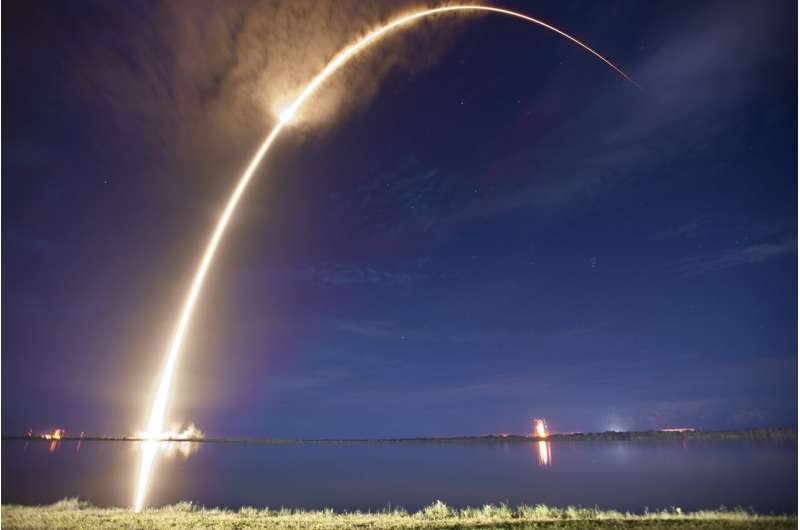
After a record 2023, SpaceX is not slowing down its launch plans for 2024 with the first launch of the year from Florida slated for Wednesday evening.
A Falcon 9 rocket carrying a telecom satellite for private Swedish company Ovzon is slated to lift off from Cape Canaveral Space Force Station’s Space Launch Complex 40 during a 10-minute window that opens at 6:04 p.m. with a backup on Thursday during an 87-minute window that opens at 4:47 p.m.
Space Launch Delta 45’s weather squadron forecasts 90% chance for favorable conditions, which increases to 95% in the event of a 24-hour delay.
The first-stage booster is flying for the 10th time and will attempt a recovery landing at Canaveral’s Landing Zone 1, meaning a double sonic boom is in store for the Space Coast.
The 3,968-pound Ovzon 3 satellite is the first privately-funded and developed Swedish geostationary satellite ever to be launched, headed for a geostationary transfer orbit where it will then propel itself to its geostationary orbit over 3-4 months at 59.7 degrees east at 22,236 miles altitude.
SpaceX had a banner year among its two Florida pads, launching 68 of the Space Coast’s 72 orbital missions, including five flights of its powerhouse Falcon Heavy and three crewed flights to the International Space Station. It added another 28 flights from Vandenberg Space Force Base in California.
The Space Coast launch isn’t SpaceX’s first of the year, though, having already sent up 21 Starlink satellites late Tuesday from Vandenberg.
“Congrats to the SpaceX team on achieving 96 launches in 2023,” company founder Elon Musk posted on X after its final two flights of the year on Dec. 28, a Falcon Heavy flight for the Space Force from Kennedy Space Center, followed less than three hours later by a Falcon 9 on a Starlink mission from Cape Canaveral.
It marked the fourth time in 2023 that SpaceX had flown two launches on a single calendar day from its two Space Coast pads, and Musk said in 2023 that plans were to increase the turnaround rate at its workhorse Cape Canaveral pad so it could fly at least two rockets per week from SLC 40. It managed a record turnaround on that pad back from Aug. 3-6 with a pair of Falcon 9 launches within three days, 21 hours, 41 minutes.
SpaceX’s Bill Gerstenmaier, now vice president of build and reliability, told a Senate subcommittee in October that the company was aiming for 12 launches per month in 2024, or 144 total for the year.
“[If] all goes well, SpaceX’s total launch mass to orbit will increase ~50% next year, not including Starship,” Musk posted.
What’s headed to the launch pad on the Space Coast in 2024
Meanwhile, United Launch Alliance looks to build up its pace with its new Vulcan Heavy rocket while finishing up its remaining launches of the last 17 Atlas V lone Delta IV Heavy rockets.
SpaceX is also putting the final touches on a new crew access arm at SLC 40 that will allow human spaceflight from both KSC and Cape Canaveral.
Its first use, though, will be after the year’s first planned human spaceflight, the private Axiom Space mission Axiom 3, headed to the ISS later this month. That flight will stick with KSC for its launch pad targeting no earlier than Jan. 17.
Having two crew-ready launch pads from Florida is a precursor to the company being able to bring its in-development Starship and Super Heavy rocket to the Space Coast in the future. SpaceX continues to build out a Starship launch tower at KSC.
For now, Starship is gearing up for its third attempt at an orbital test flight from the company’s Boca Chica, Texas launch facility Starbase. Two attempts in 2023 ended with explosive results, but the hardware for flight No. 3 is already in place with the company having performed static fire engine tests before the new year.
When it does successfully fly, the goal is for it to become the first fully reusable rocket with both the Super Heavy booster and Starship first-stage capable of recovery landings.
“Starship is a whole new level,” Musk posted.
2024 Orlando Sentinel. Distributed by Tribune Content Agency, LLC.
Citation:
SpaceX back with 1st Space Coast launch of the year (2024, January 3)
retrieved 3 January 2024
from https://phys.org/news/2024-01-spacex-1st-space-coast-year.html
This document is subject to copyright. Apart from any fair dealing for the purpose of private study or research, no
part may be reproduced without the written permission. The content is provided for information purposes only.

